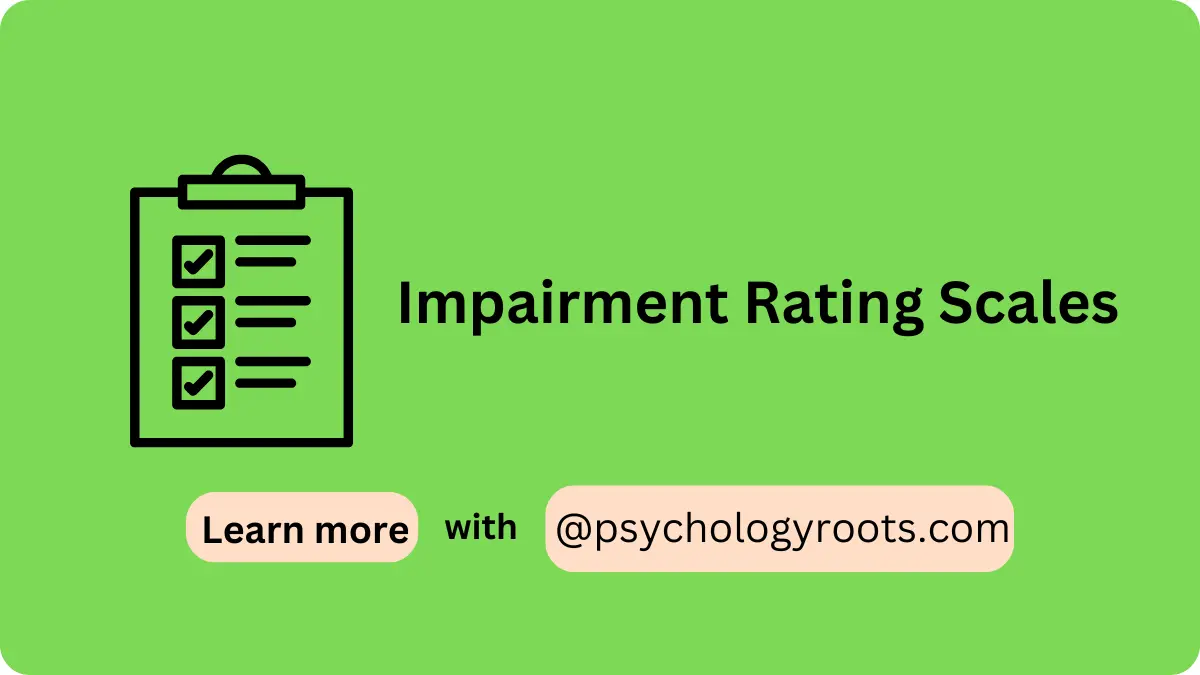Table of Contents
Impairment Rating Scales
Here in this post, we are sharing the “Impairment Rating Scales”. You can read psychometric and Author information. We have thousands of Scales and questionnaires in our collection (See Scales and Questionnaires). You can demand us any scale and questionnaires related to psychology through our community, and we will provide you with a short time. Keep visiting Psychology Roots.
About Impairment Rating Scales
Scale Name
Impairment Rating Scales
Author Details
Anne E Dawson, Theresa E Egan, and Brian T Wymbs
Translation Availability
Not Sure

Background/Description
The Impairment Rating Scales (IRS) were developed as a tool to assess the functional impairments experienced by individuals diagnosed with Attention Deficit Hyperactivity Disorder (ADHD) and other conditions that may affect daily functioning. The IRS is widely used in both clinical and research settings to measure how symptoms of ADHD translate into impairments across different domains, including social, occupational, and academic settings.
Functional impairment is a key diagnostic criterion for ADHD, and it is essential to distinguish between the presence of symptoms and the level of impairment caused by those symptoms. The IRS helps clinicians and researchers determine the severity of impairments and guide treatment decisions by providing a standardized measure of functioning in critical life areas.
This tool is particularly useful in adult populations, where ADHD symptoms may manifest differently compared to children, and where the focus is often on work, relationships, and other adult responsibilities.
Purpose:
The IRS is used to evaluate how ADHD symptoms or other conditions impact key areas of functioning. It can assist in tracking progress over time, measuring the effectiveness of interventions, and informing treatment planning.
Administration, Scoring and Interpretation
- Format: The IRS consists of a series of items rated on a Likert scale, with respondents indicating the level of impairment in various areas of their life (e.g., work, school, social interactions).
- Respondents: The IRS is designed for use with adults diagnosed with ADHD, but it can also be adapted for other populations experiencing functional impairments. Self-report is common, but clinician-administered versions are also available.
Reliability and Validity
According to the research by Dawson, Egan, and Wymbs (2020), the Impairment Rating Scales show strong psychometric properties, including high internal consistency and test-retest reliability. The tool has demonstrated good validity, correlating well with other measures of functional impairment and ADHD symptoms.
Available Versions
Multiple-Items
Reference
Dawson, A. E., Egan, T. E., & Wymbs, B. T. (2020). Psychometric Properties of the Impairment Rating Scale in Samples of Adults With Attention Deficit Hyperactivity Disorder. Assessment, 27(2), 384–403. https://doi.org/10.1177/1073191117746502
Important Link
Scale File:
Frequently Asked Questions
What does the Impairment Rating Scale measure?
The IRS measures functional impairments in various areas of life, such as work, academic performance, and social relationships, often in individuals with ADHD.
Who is the target population for the IRS?
The IRS is primarily used with adults diagnosed with ADHD, but it can be adapted for other populations experiencing similar functional impairments.
How is the IRS administered?
The IRS can be self-administered or completed by a clinician. Respondents rate the level of impairment they experience in different life domains.
How are responses scored?
Responses are scored on a Likert scale, with higher scores indicating greater levels of impairment. The total score reflects the overall severity of functional impairments.
Is the IRS reliable?
Yes, research has shown that the IRS has strong reliability and validity in measuring functional impairments in adults with ADHD.
Disclaimer
Please note that Psychology Roots does not have the right to grant permission for the use of any psychological scales or assessments listed on its website. To use any scale or assessment, you must obtain permission directly from the author or translator of the tool. Psychology Roots provides information about various tools and their administration procedures, but it is your responsibility to obtain proper permissions before using any scale or assessment. If you need further information about an author’s contact details, please submit a query to the Psychology Roots team.
Help Us Improve This Article
Have you discovered an inaccuracy? We put out great effort to give accurate and scientifically trustworthy information to our readers. Please notify us if you discover any typographical or grammatical errors.
Make a comment. We acknowledge and appreciate your efforts.
Share With Us
If you have any scale or any material related to psychology kindly share it with us at psychologyroots@gmail.com. We help others on behalf of you.